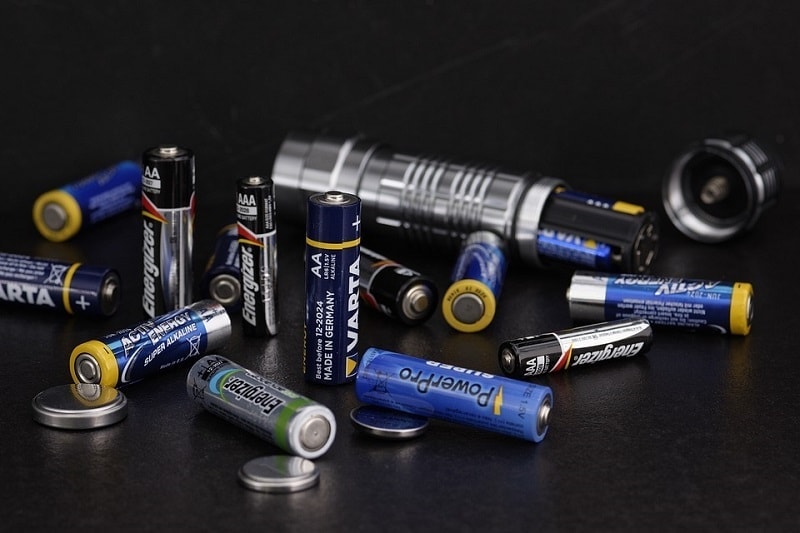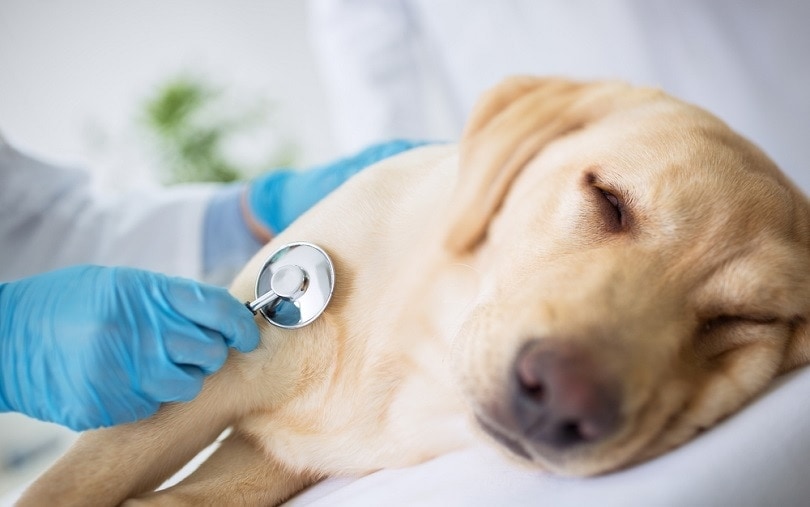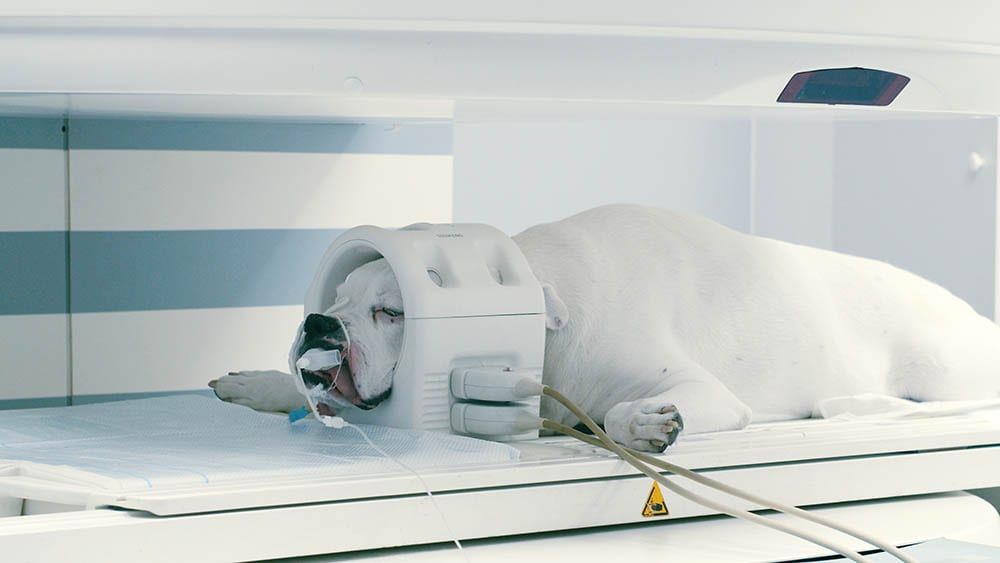My Dog Ate a Battery! Here’s What to Do (Vet Answer)

Updated on

Dogs are curious creatures and love to investigate new or interesting items with their mouth and nose. Unfortunately, this means that they commonly chew or swallow household objects that they probably shouldn’t! Modern, small batteries pose a particular temptation. Occasionally, dogs will swallow a battery, and this creates an extremely dangerous situation. If your dog has eaten a battery, contact your veterinarian immediately and follow their instructions.
In this article, we will explore why batteries can be so dangerous and what to do to give your dog the best chance of a good outcome.
 Why Are Batteries Dangerous to Dogs?
Why Are Batteries Dangerous to Dogs?
Batteries can pose a threat to dogs (and to people!) in three ways.
- They can physically block the gut when they are swallowed, causing a bowel obstruction. This can damage the gut itself and make dogs very ill. This problem would be most likely in a smaller dog or with a larger battery. Bowel obstructions in themselves can be life-threatening, especially if the intestine starts to thin and tear.
- Batteries are designed to create electricity. Inside the wet conditions of the digestive system, they can form an electrical circuit that will burn the lining of the mouth, stomach, or intestine. Burns may cause severe damage and even form a hole in the gut. This is particularly a risk with disc or watch batteries, which can start to cause problems within as little as 15 minutes.
- Batteries work by using a combination of heavy metals (for example, lead, cadmium, and lithium) and strong corrosive chemicals (either acids like sulfuric acid, or alkaline solutions like potassium hydroxide). If the battery is broken or pierced, battery acid or other chemicals can leak out and either burn or poison the parts of the body they contact. Modern batteries are very tough but chemical burns or poisoning are always a risk.

What to Do if Your Dog Eats a Battery
If your dog ate a battery, the first step is not to panic! Although this is a serious situation and needs immediate attention, there are lots of interventions to prevent the more dangerous consequences.
- If possible, take anything else your dog might swallow away to ensure nothing further is accidentally swallowed (parts of a toy, for example). Ensure your dog is away from any other dangerous objects.
- Try and establish what your dog has eaten, as accurately as you can, and roughly when it was eaten. You might need to look at the toy or remote control to establish which batteries are missing.
- Make immediate contact with your local veterinarian and pass on as much information as you can to them. If your usual vet isn’t open, call an emergency clinic or another local veterinarian—it is imperative you talk to a veterinarian as soon as possible.
- Follow your veterinarian’s advice on what to do next. Based on your information, they will be able to give you tailored, professional advice to give your dog the best chance of a successful outcome.
- Be careful if you have handled any batteries, especially leaky ones. Ensure you wash your hands thoroughly afterward to remove any traces of battery fluid.
Dog Ate Battery Symptoms
When a battery is swallowed, the battery goes from mouth to food pipe to stomach. Initially, batteries may cause damage to the mouth, leaving red, angry burns and sores on the gums and tongue- especially if they have been pierced and battery fluid is leaking out. As they travel down the food pipe, they will start to irritate the lining and this causes retching, choking, and vomiting. As the battery hits the stomach and potentially tries to enter the intestines, vomiting is the main sign to watch for.
If the stomach is badly damaged dogs may vomit blood, which often appears darker than expected (like coffee grounds). If a battery gets stuck further down, dogs will stop eating and be very uncomfortable around their tummy.
What Treatment Might My Dog Need After Eating a Battery?
Based on the information you provide, and a thorough examination of your dog, your local veterinary clinic will be able to recommend the best course of action for your specific circumstances.
Dilution of Battery Acid
It is important to check the dog’s mouth for any signs of chemical burns or damage, especially if the battery is leaky. Burns may need flushing and cleaning with lots of water to dilute the chemicals and prevent further damage. If veterinary treatment is delayed for any reason, it is sensible to have a look yourself if it is safe to do so, and carefully flush any red or angry areas you find with tap water. Be aware that your dog may be uncomfortable and behave unusually—only look inside your dog’s mouth if you think it is safe to do so.
Inducing Vomiting in Dogs That Have Eaten Batteries
When dogs eat unusual objects that may cause a problem, one common solution is to give the dog an injection that causes strong vomiting to bring the item back again. This is usually not recommended with batteries because of the risk of them leaking their contents as it passes from mouth to stomach and back again. Please do not make your dog vomit at home as this can cause severe problems.

X-raying for Evidence of the Battery
It is common to take x-rays of your dog’s tummy, as this will identify the battery shape, type, and where it is inside your dog. It also gives an idea of whether the battery is leaking or not. This will help guide further decision-making.
Monitoring the Situation
If the battery is the right shape and not leaking, and your dog is otherwise well, your veterinarian may recom
mend monitoring the situation and keeping a close eye. The simplest solution is for the battery to pass through the gut in one piece and come out the other end! This should only be done under close veterinary supervision, as a bowel obstruction can occur at any time and in any dog.
Surgery for Gut Obstruction or a Leaking Battery
In some situations, the risks of allowing the battery to pass are too high. This would be more likely with a leaky battery, a disc or watch battery, or a battery that is starting to get stuck and make your dog poorly. In these cases, it is much safer for your dog, in the long run, to have the battery removed by the veterinary clinic. This can be done by a flexible camera (endoscope) if the battery is in the food pipe or stomach, or by surgery in other cases.
Surgery to remove objects from a dog’s tummy is a very common procedure for many clinics and is usually completed quickly and safely. The sooner these interventions can be made, the better chances your dog will have of a full recovery.
Can a Dog Die From Eating a Battery?
Unfortunately, the answer to this is yes—a dog can die from eating a battery. Batteries can cause bowel obstructions, electrical, and chemical burns to the gut, as well as heavy metal poisoning. Any damage to the stomach and intestines will be very painful and make your dog very poorly within 24 hours. If the digestive tract is damaged to the point of rupture, this can rapidly kill dogs. For these reasons and more, it is absolutely vital to seek professional veterinary assistance and advice at an early stage.
The sooner the problem is identified and correctly managed, the fewer complications and consequences there will be for you and your dog.
 Summary
Summary
If a dog eats a battery, there can be life-threatening consequences as batteries can present several hazards. Don’t panic though! With quick and careful action and the right veterinary care, you can give your dog the best chance of a successful outcome!
Also see:
- My Dog Ate a Pencil! Our Vet Explains What to Do
- My Dog Ate a Tampon! Here’s What to Do (Vet Answer)
Featured Image Credit: Visor69, Pixabay

 Why Are Batteries Dangerous to Dogs?
Why Are Batteries Dangerous to Dogs?










